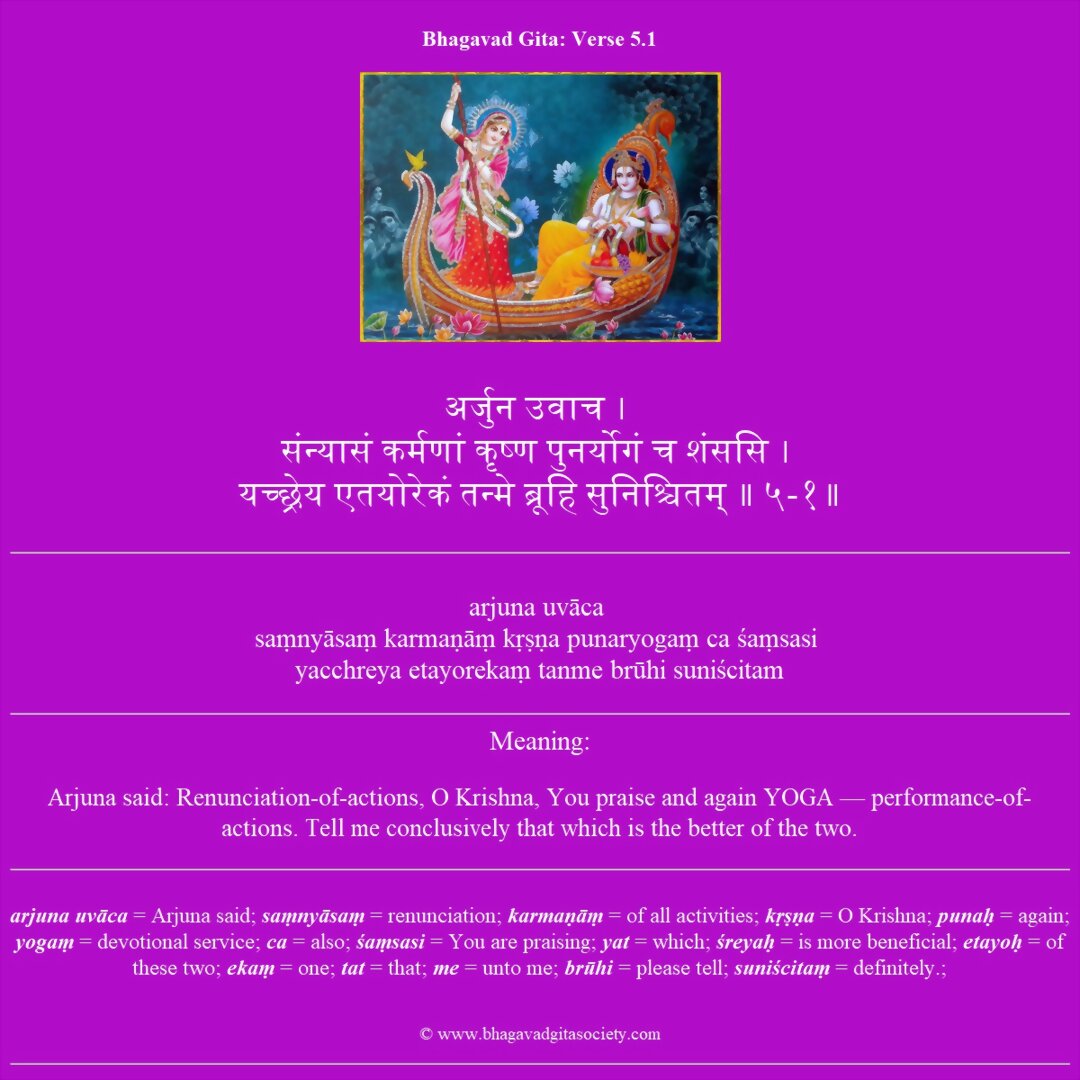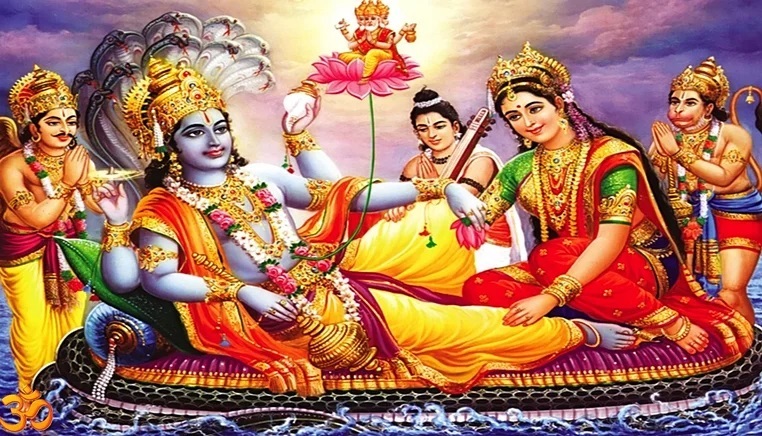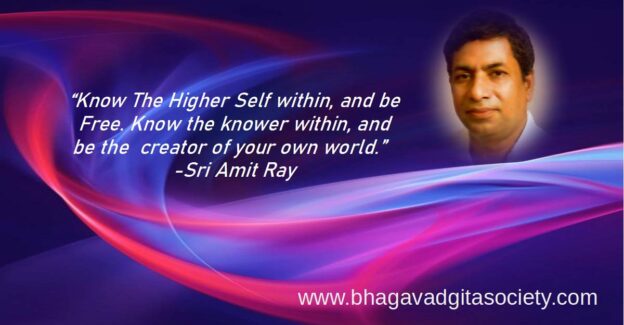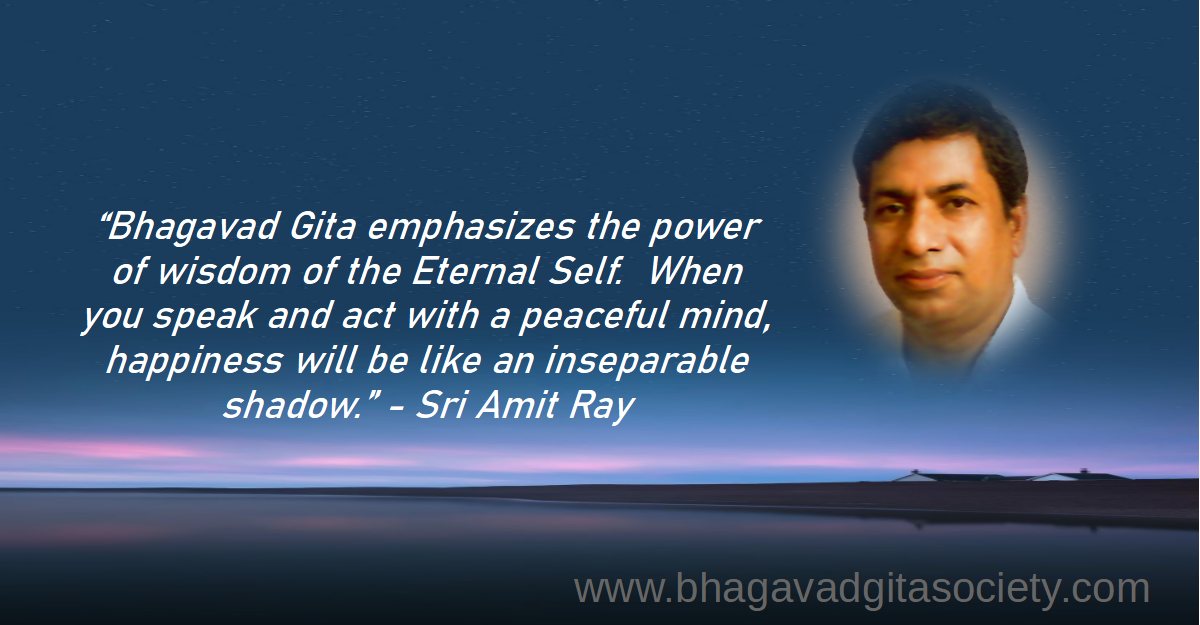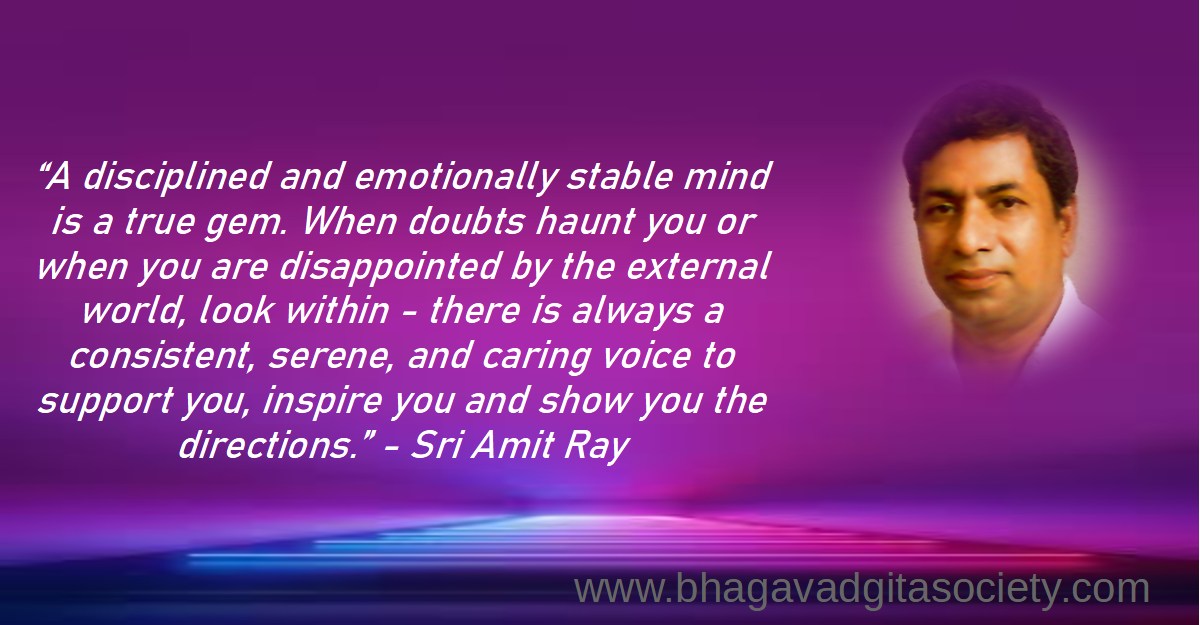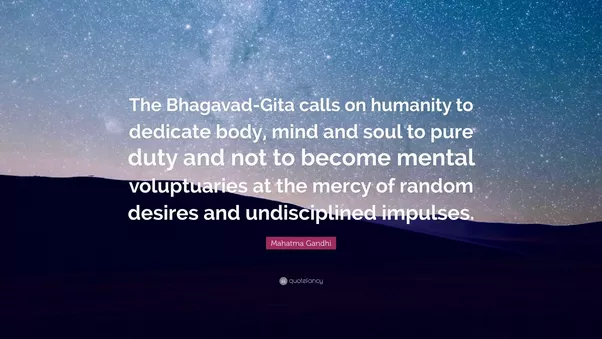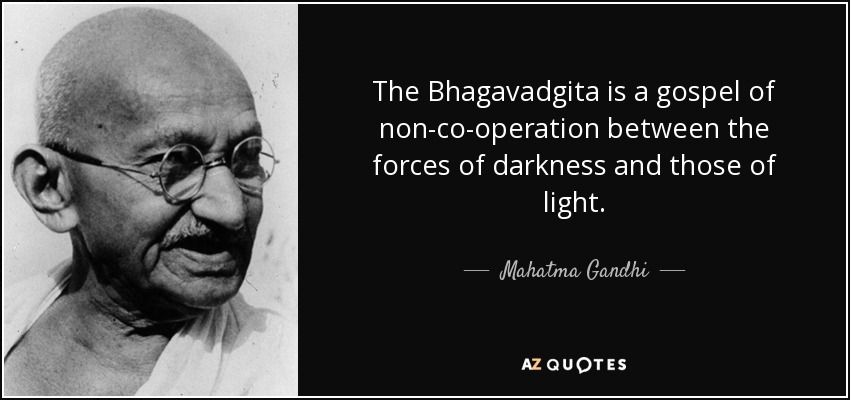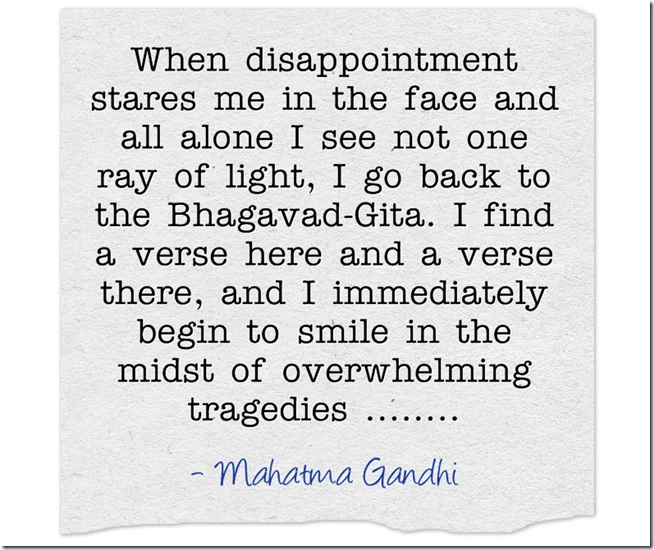This chapter contains 78 verses. In this chapter, the conclusions of previous seventeen chapters are summed up. Krishna asks Arjuna to abandon all forms of dharma and simply surrender unto him and describes this as the ultimate perfection of life.

Here, Krishna explains the meaning of renunciation and the effects of the modes of nature on human consciousness and activity. He explains the realization of Universal Self , the glories of the Bhagavad Gita, and the ultimate conclusion of the Gita: the highest path of religion is absolute, unconditional loving service unto Lord Krishna.
Summary of the Chapter 18:
Arjuna wanted to know the true meaning of renunciation (sannyasa) and detachment (tyaga) as well as the difference between them. The Supreme Lord said, To give up the results of all activities is called renunciation. There are three kinds of detachment (tyaga) based on the three gunaas. The foremost is sattvic tyaaga where the individual performs his duty and gives up attachment to the reward. Finally, Lord Krishna said, “Giving up all karmas, take refuge in Me alone. I will release you from all karma; do not grieve”.
Verses of the Chapter 18 of Bhagavad Gita are as follows:
Chapter 18, Verse 1
Arjuna said, O mighty-armed one, I wish to understand the purpose of renunciation [ty?ga] and of the renounced order of life [sanny?sa], O killer of the Ke?? demon, H???ke?a.
Chapter 18, Verse 2
The Supreme Lord said, To give up the results of all activities is called renunciation [ty?ga] by the wise. And that state is called the renounced order of life [sanny?sa] by great learned men.
Chapter 18, Verse 3
Some learned men declare that all kinds of fruitive activities should be given up, but there are yet other sages who maintain that acts of sacrifice, charity and penance should never be abandoned.
Chapter 18, Verse 4
O best of the Bharatas, hear from Me now about renunciation. O tiger among men, there are three kinds of renunciation declared in the scriptures.
Chapter 18, Verse 5
Acts of sacrifice, charity and penance are not to be given up but should be performed. Indeed, sacrifice, charity and penance purify even the great souls.
Chapter 18, Verse 6
All these activities should be performed without any expectation of result. They should be performed as a matter of duty, O son of Pitha. That is My final opinion.
Chapter 18, Verse 7
Prescribed duties should never be renounced. If, by illusion, one gives up his prescribed duties, such renunciation is said to be in the mode of ignorance.
Chapter 18, Verse 8
Anyone who gives up prescribed duties as troublesome, or out of fear, is said to be in the mode of passion. Such action never leads to the elevation of renunciation.
Chapter 18, Verse 9
But he who performs his prescribed duty only because it ought to be done, and renounces all attachment to the fruit-his renunciation is of the nature of goodness, O Arjuna.
Chapter 18, Verse 10
Those who are situated in the mode of goodness, who neither hate inauspicious work nor are attached to auspicious work, have no doubts about work.
Chapter 18, Verse 11
It is indeed impossible for an embodied being to give up all activities. Therefore it is said that he who renounces the fruits of action is one who has truly renounced.
Chapter 18, Verse 12
For one who is not renounced, the threefold fruits of action-desirable, undesirable and mixed-accrue after death. But those who are in the renounced order of life have no such results to suffer or enjoy.
Chapter 18, Verse 13-14
O mighty-armed Arjuna, learn from Me of the five factors which bring about the accomplishment of all action. These are declared in s??khya philosophy to be the place of action, the performer, the senses, the endeavor, and ultimately the Supersoul.
Chapter 18, Verse 15
Whatever right or wrong action a man performs by body, mind or speech is caused by these five factors.
Chapter 18, Verse 16
Therefore one who thinks himself the only doer, not considering the five factors, is certainly not very intelligent and cannot see things as they are.
Chapter 18, Verse 17
One who is not motivated by false ego, whose intelligence is not entangled, though he kills men in this world, is not the slayer. Nor is he bound by his actions.
Chapter 18, Verse 18
Knowledge, the object of knowledge and the knower are the three factors which motivate action; the senses, the work and the doer comprise the threefold basis of action.
Chapter 18, Verse 19
In accordance with the three modes of material nature, there are three kinds of knowledge, action, and performers of action. Listen as I describe them.
Chapter 18, Verse 20
That knowledge by which one undivided spiritual nature is seen in all existences, undivided in the divided, is knowledge in the mode of goodness.
Chapter 18, Verse 21
That knowledge by which a different type of living entity is seen to be dwelling in different bodies is knowledge in the mode of passion.
Chapter 18, Verse 22
And that knowledge by which one is attached to one kind of work as the all in all, without knowledge of the truth, and which is very meager, is said to be in the mode of darkness.
Chapter 18, Verse 23
As for actions, that action in accordance with duty, which is performed without attachment, without love or hate, by one who has renounced fruitive results, is called action in the mode of goodness.
Chapter 18, Verse 24
But action performed with great effort by one seeking to gratify his desires, and which is enacted from a sense of false ego, is called action in the mode of passion.
Chapter 18, Verse 25
And that action performed in ignorance and delusion without consideration of future bondage or consequences, which inflicts injury and is impractical, is said to be action in the mode of ignorance.
Chapter 18, Verse 26
The worker who is free from all material attachments and false ego, who is enthusiastic and resolute and who is indifferent to success or failure, is a worker in the mode of goodness.
Chapter 18, Verse 27
But that worker who is attached to the fruits of his labor and who passionately wants to enjoy them, who is greedy, envious and impure and moved by happiness and distress, is a worker in the mode of passion.
Chapter 18, Verse 28
And that worker who is always engaged in work against the injunction of the scripture, who is materialistic, obstinate, cheating and expert in insulting others, who is lazy, always morose and procrastinating, is a worker in the mode of ignorance.
Chapter 18, Verse 29
Now, O winner of wealth, please listen as I tell you in detail of the three kinds of understanding and determination according to the three modes of nature.
Chapter 18, Verse 30
O son of Pitha, that understanding by which one knows what ought to be done and what ought not to be done, what is to be feared and what is not to be feared, what is binding and what is liberating, that understanding is established in the mode of goodness.
Chapter 18, Verse 31
And that understanding which cannot distinguish between the religious way of life and the irreligious, between action that should be done and action that should not be done, that imperfect understanding, O son of Pitha, is in the mode of passion.
Chapter 18, Verse 32
That understanding which considers irreligion to be religion and religion to be irreligion, under the spell of illusion and darkness, and strives always in the wrong direction, O Partha, is in the mode of ignorance.
Chapter 18, Verse 33
O son of Pitha, that determination which is unbreakable, which is sustained with steadfastness by yoga practice, and thus controls the mind, life, and the acts of the senses, is in the mode of goodness.
Chapter 18, Verse 34
And that determination by which one holds fast to fruitive result in religion, economic development and sense gratification is of the nature of passion, O Arjuna.
Chapter 18, Verse 35
And that determination which cannot go beyond dreaming, fearfulness, lamentation, moroseness, and illusion-such unintelligent determination is in the mode of darkness.
Chapter 18, Verse 36-37
O best of the Bharatas, now please hear from Me about the three kinds of happiness which the conditioned soul enjoys, and by which he sometimes comes to the end of all distress. That which in the beginning may be just like poison but at the end is just like nectar and which awakens one to self-realization is said to be happiness in the mode of goodness.
Chapter 18, Verse 38
That happiness which is derived from contact of the senses with their objects and which appears like nectar at first but poison at the end is said to be of the nature of passion.
Chapter 18, Verse 39
And that happiness which is blind to self-realization, which is delusion from beginning to end and which arises from sleep, laziness and illusion is said to be of the nature of ignorance.
Chapter 18, Verse 40
There is no being existing, either here or among the demigods in the higher planetary systems, which is freed from the three modes of material nature.
Chapter 18, Verse 41
Br?hma?as, k?atriyas, vai?yas and ??dras are distinguished by their qualities of work, O chastiser of the enemy, in accordance with the modes of nature.
Chapter 18, Verse 42
Peacefulness, self-control, austerity, purity, tolerance, honesty, wisdom, knowledge, and religiousness-these are the qualities by which the br?hma?as work.
Chapter 18, Verse 43
Heroism, power, determination, resourcefulness, courage in battle, generosity, and leadership are the qualities of work for the k?atriyas.
Chapter 18, Verse 44
Farming, cattle raising and business are the qualities of work for the vai?yas, and for the ??dras there is labor and service to others.
Chapter 18, Verse 45
By following his qualities of work, every man can become perfect. Now please hear from Me how this can be done.
Chapter 18, Verse 46
By worship of the Lord, who is the source of all beings and who is all-pervading, man can, in the performance of his own duty, attain perfection.
Chapter 18, Verse 47
It is better to engage in one’s own occupation, even though one may perform it imperfectly, than to accept another’s occupation and perform it perfectly. Prescribed duties, according to one’s nature, are never affected by sinful reactions.
Chapter 18, Verse 48
Every endeavor is covered by some sort of fault, just as fire is covered by smoke. Therefore one should not give up the work which is born of his nature, O son of Kunti, even if such work is full of fault.
Chapter 18, Verse 49
One can obtain the results of renunciation simply by self-control and by becoming unattached to material things and disregarding material enjoyments. That is the highest perfectional stage of renunciation.
Chapter 18, Verse 50
O son of Kunti, learn from Me in brief how one can attain to the supreme perfectional stage, Brahman, by acting in the way which I shall now summarize.
Chapter 18, Verse 51-53
Being purified by his intelligence and controlling the mind with determination, giving up the objects of sense gratification, being freed from attachment and hatred, one who lives in a secluded place, who eats little and who controls the body and the tongue, and is always in trance and is detached, who is without false ego, false strength, false pride, lust, anger, and who does not accept material things, such a person is certainly elevated to the position of self-realization.
Chapter 18, Verse 54
One who is thus transcendentally situated at once realizes the Supreme Brahman. He never laments nor desires to have anything; he is equally disposed to every living entity. In that state he attains pure devotional service unto Me.
Chapter 18, Verse 55
One can understand the Supreme Personality as He is only by devotional service. And when one is in full consciousness of the Supreme Lord by such devotion, he can enter into the kingdom of God.
Chapter 18, Verse 56
Though engaged in all kinds of activities, My devotee, under My protection, reaches the eternal and imperishable abode by My grace.
Chapter 18, Verse 57
In all activities just depend upon Me and work always under My protection. In such devotional service, be fully conscious of Me.
Chapter 18, Verse 58
If you become conscious of Me, you will pass over all the obstacles of conditional life by My grace. If, however, you do not work in such consciousness but act through false ego, not hearing Me, you will be lost.
Chapter 18, Verse 59
If you do not act according to My direction and do not fight, then you will be falsely directed. By your nature, you will have to be engaged in warfare.
Chapter 18, Verse 60
Under illusion you are now declining to act according to My direction. But, compelled by your own nature, you will act all the same, O son of Kunti.
Chapter 18, Verse 61
The Supreme Lord is situated in everyone’s heart, O Arjuna, and is directing the wanderings of all living entities, who are seated as on a machine, made of the material energy.
Chapter 18, Verse 62
O scion of Bharata, surrender unto Him utterly. By His grace you will attain transcendental peace and the supreme and eternal abode.
Chapter 18, Verse 63
Thus I have explained to you the most confidential of all knowledge. Deliberate on this fully, and then do what you wish to do.
Chapter 18, Verse 64
Because you are My very dear friend, I am speaking to you the most confidential part of knowledge. Hear this from Me, for it is for your benefit.
Chapter 18, Verse 65
Always think of Me and become My devotee. Worship Me and offer your homage unto Me. Thus you will come to Me without fail. I promise you this because you are My very dear friend.
Chapter 18, Verse 66
Abandon all varieties of religion and just surrender unto Me. I shall deliver you from all sinful reaction. Do not fear.
Chapter 18, Verse 67
This confidential knowledge may not be explained to those who are not austere, or devoted, or engaged in devotional service, nor to one who is envious of Me.
Chapter 18, Verse 68
For one who explains the supreme secret to the devotees, devotional service is guaranteed, and at the end he will come back to Me.
Chapter 18, Verse 69
There is no servant in this world more dear to Me than he, nor will there ever be one more dear.
Chapter 18, Verse 70
And I declare that he who studies this sacred conversation worships Me by his intelligence.
Chapter 18, Verse 71
And one who listens with faith and without envy becomes free from sinful reaction and attains to the planets where the pious dwell.
Chapter 18, Verse 72
O conqueror of wealth, Arjuna, have you heard this attentively with your mind? And are your illusions and ignorance now dispelled?
Chapter 18, Verse 73
Arjuna said, My dear Krishna, O infallible one, my illusion is now gone. I have regained my memory by Your mercy, and I am now firm and free from doubt and am prepared to act according to Your instructions.
Chapter 18, Verse 74
Sa?jaya said: Thus have I heard the conversation of two great souls, Krishna and Arjuna. And so wonderful is that message that my hair is standing on end.
Chapter 18, Verse 75
By the mercy of Vy?sa, I have heard these most confidential talks directly from the master of all mysticism, Krishna, who was speaking personally to Arjuna.
Chapter 18, Verse 76
O King, as I repeatedly recall this wondrous and holy dialogue between Krishna and Arjuna, I take pleasure, being thrilled at every moment.
Chapter 18, Verse 77
O King, when I remember the wonderful form of Lord Krishna, I am struck with even greater wonder, and I rejoice again and again.
Chapter 18, Verse 78
Wherever there is Krishna, the master of all mystics, and wherever there is Arjuna, the supreme archer, there will also certainly be opulence, victory, extraordinary power, and morality. That is my opinion.


